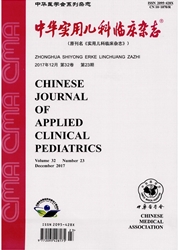

 中文摘要:
中文摘要:
晚期早产儿神经发育障碍的发生率明显高于足月儿,例如脑性瘫痪、发育迟缓、智力障碍、学习问题和行为问题等.原因与其脑发育不完善、疾病、监护和教育的影响等有关,应通过病史、早期神经发育评估、电生理学评估和神经影像学评估等方法,综合进行神经发育障碍的早期识别,并制定适宜的干预措施,包括日常功能训练、康复训练、心理治疗、特殊学校教育等,给予长期的评估、监测和随访,以改善人类健康状况.
 英文摘要:
英文摘要:
Compared with term infants,late preterm infants experience poorer neurodevelopment outcomes such as cerebral palsy,developmental delay,mental retardation,school performance and behavioural problems because of their immature brain,impact of diseases,neonatal care and later education.Case history,early neurodevelopment evaluation,electrophysiology evaluation and neuroimaging evaluation are needed to early identify neurodevelopment disability.Similarly,appropriate intervention such as daily function training,rehabilitation training,psychotherapy,special school education and a long-term evaluation,monitoring and follow-up of late preterm infants are needed to improve human health status.
 同期刊论文项目
同期刊论文项目
 同项目期刊论文
同项目期刊论文
 Targeting Hypoxia Inducible Factor-1 alpha: A Novel Mechanism of Ginsenoside Rg1 for Brain Repair af
Targeting Hypoxia Inducible Factor-1 alpha: A Novel Mechanism of Ginsenoside Rg1 for Brain Repair af In Vitro Effects of Hypoxia-Inducible Factor 1 alpha on the Biological Characteristics of the SiHa U
In Vitro Effects of Hypoxia-Inducible Factor 1 alpha on the Biological Characteristics of the SiHa U Signaling pathway involved in hypoxia-inducible factor-1 alpha regulation in hypoxic-ischemic cortic
Signaling pathway involved in hypoxia-inducible factor-1 alpha regulation in hypoxic-ischemic cortic Influence of hypoxia-inducible factor 1-alpha on neuronal apoptosis in a rat model of hypoxia- or hy
Influence of hypoxia-inducible factor 1-alpha on neuronal apoptosis in a rat model of hypoxia- or hy 期刊信息
期刊信息
